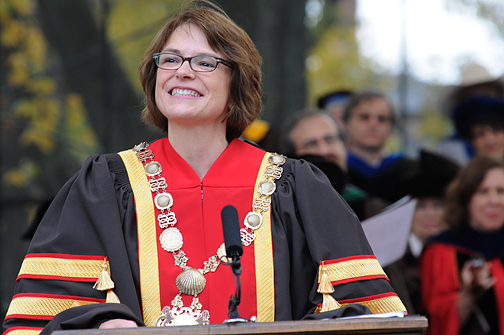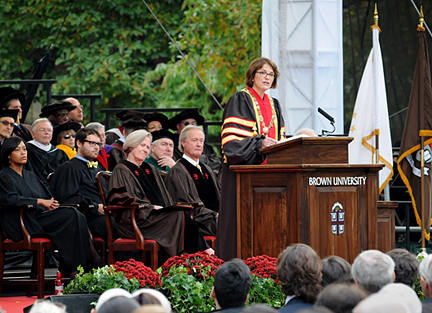October 27, 2012—Numbers matter. At least that’s one impression drawn from the inauguration of President Christina Paxson today. The ceremony, which took place on the College Green under changeable skies just a few days before Hurricane Sandy was due to arrive on the East Coast, had its share of notable guests, including Providence Mayor Angel Taveras, U.S. Senator Jack Reed, and Rhode Island Governor Lincoln Chafee ’75. ("Brown is a quintessentially Rhode Island institution," Reed told the audience. "It is fiercely independent and fiercely unique.") But it was outgoing Princeton President Shirley Tilghman who got the crowd going.

Paxson has three qualities that, Tilghman says, make Brown and her “superbly matched”: the ability to listen thoughtfully, to forge consensus “whenever possible,” and to make difficult decisions and stick to them, even if they do not please everyone.
But it was Paxson who was the star of the afternoon. Her inaugural speech was a passionate defense of scholarly work during a bottom-line era, when the most pressing question asked about a college education is whether it will get a graduate a job. Acknowledging the great importance of that issue, Paxson, an economist, pointed out that today is not the first time in our history that a recession or depression has prompted leaders to attack universities for spending too much time and money on such things as the humanities or basic research
She cited a 1939 speech by Brown president Henry Wriston, who decried the growing criticisms of universities that arose during and after the Great Depression. The job of a university, Paxson said, is to prepare students not only to survive the world as it is today but to work to make it a better world. It’s Brown place, she argued, to teach students something “more nuanced but ultimately more valuable” than a trade, to teach “not just a curriculum, but intellectual curiosity, integrity, and imaginative thought.”

Or as Paxson put it, “Scholarship is uncertain, difficult to measure, and [its usefulness] may not be realized for decades, or even centuries.” Yes, universities must be in the forefront of solving today’s problems—she herself became an economist, she said, to understand the connection between resource allocation and human well-being—but if universities don’t take the long view in both science and the humanities, no one will.
As she concluded her speech, people in the audience began to look upward, first one head swiveling up, and then a few more, and finally those of the curious all around the Green. Directly overhead, a small crescent of rainbow had emerged among the clouds.
Read the text of Paxson's address here.





